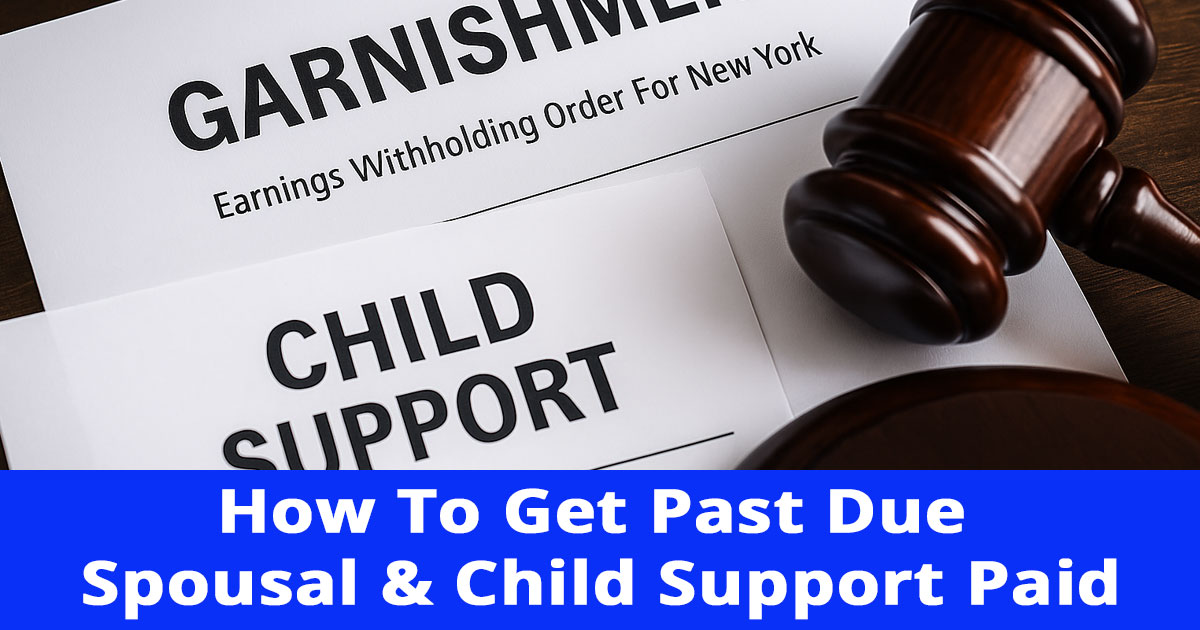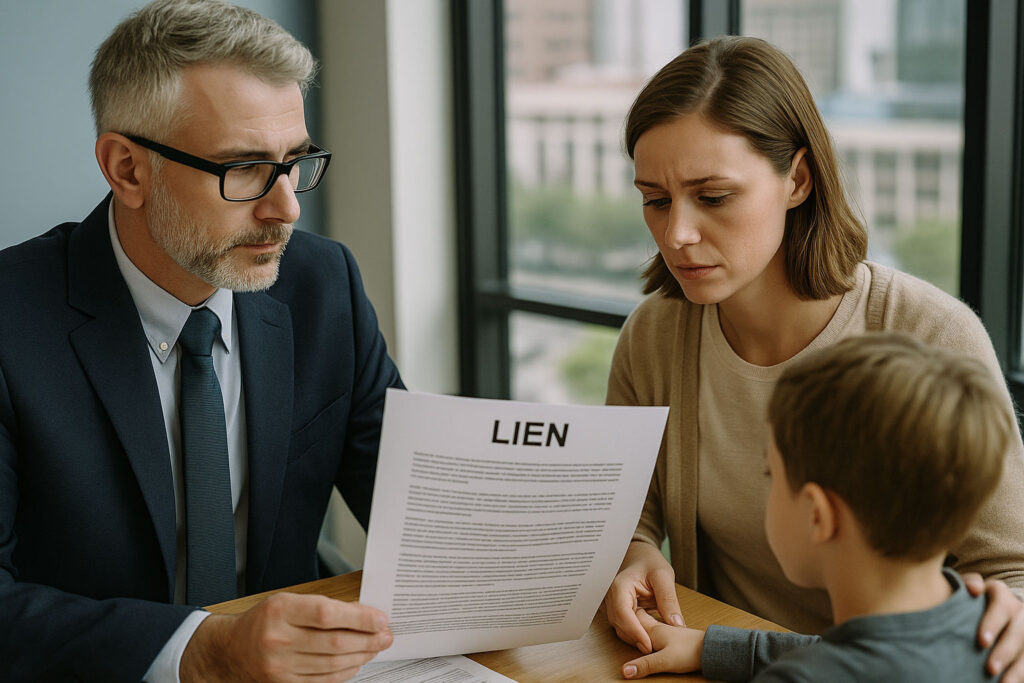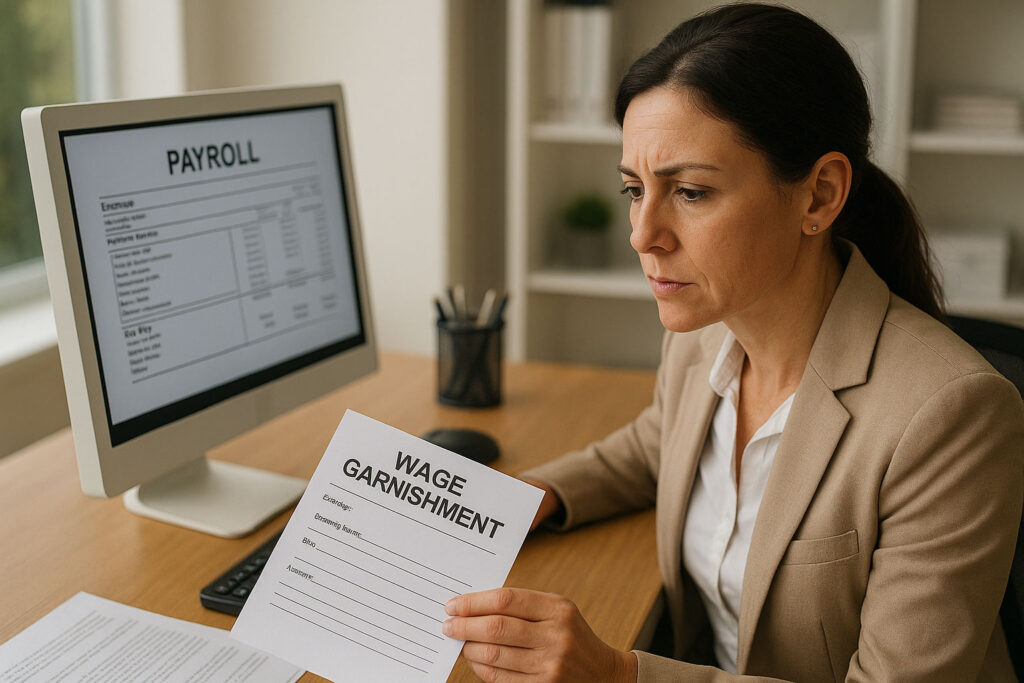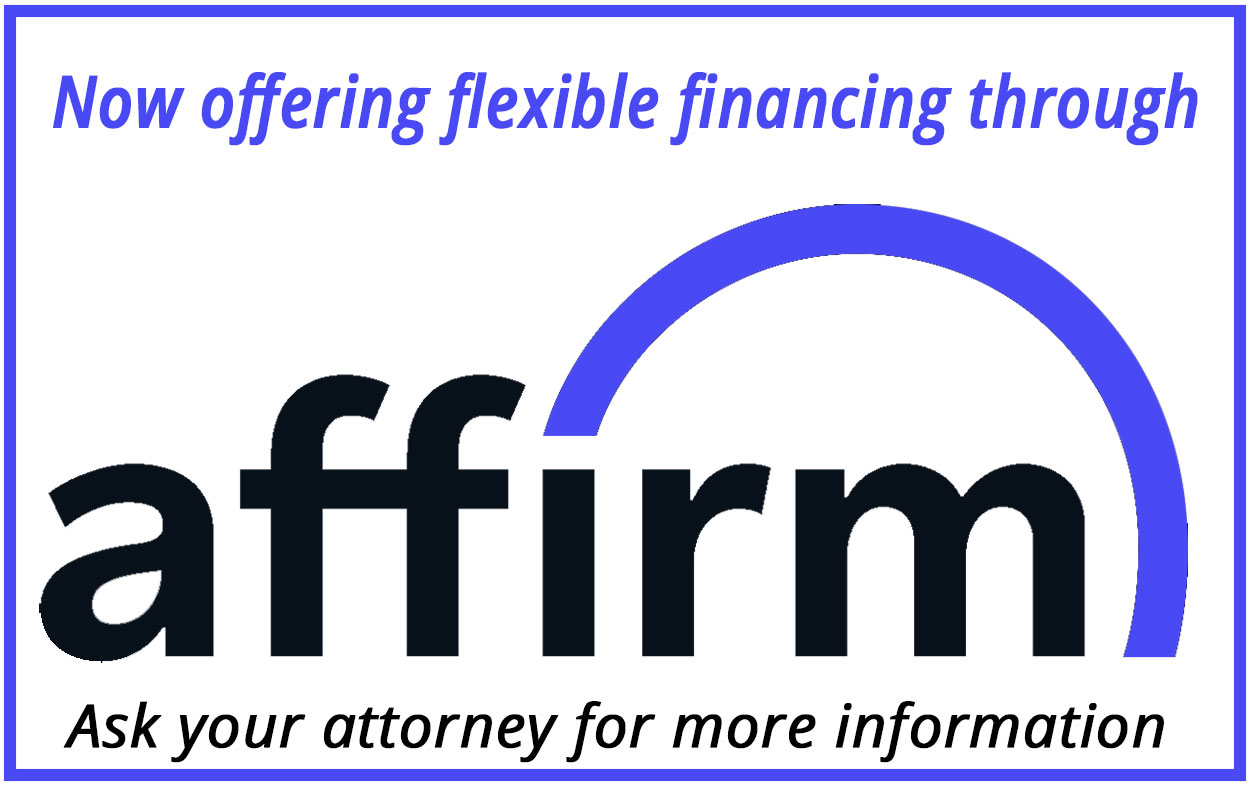Home »
How To Get Past Due Spousal & Child Support Paid on Long Island, NY

When a parent or former spouse stops paying court-ordered support, it’s more than an inconvenience; it is a violation of trust that can threaten your family’s financial stability.
Across Long Island, from Mineola to Riverhead, spouses and children depend on those child support and spousal support payments to maintain housing, schooling, and provide stability for the family. When those payments don’t arrive, New York law provides powerful enforcement tools to help you collect what you’re owed.
Two of the strongest remedies available to collect owed support payments are wage garnishment and liens. Both of these remedies allow you to recover unpaid child support or spousal maintenance directly from the source, either the person’s wages or their property, without constant court battles.
This in-depth guide from Robert E. Hornberger Esq., founding and managing partner of Hornberger Verbitsky, P.C. explains exactly how these enforcement methods work in Nassau and Suffolk counties, what your rights are under New York state law, and how to pursue justice with compassion and confidence.
Key Takeaways from This Article
- Wage garnishment and liens are powerful, court-approved enforcement tools for collecting unpaid child or spousal support.
- Garnishment ensures consistent payments by automatically deducting from wages.
- Liens secure arrears against property until debts are fully paid.
- Nassau and Suffolk Family Courts, along with SCU, handle most enforcement actions efficiently.
- Nonpayment is considered willful and can lead to contempt or license suspension.
- Liens can block property sales and affect credit until satisfied.
- Garnishment continues across job changes and state lines.
- Both remedies can be used together for maximum effect.
- Support debts cannot be erased through bankruptcy.
- Early legal intervention prevents arrears from spiraling.
- Enforcement ensures children’s stability, not punishment.
- A skilled Long Island family law attorney can balance firmness with compassion in every case.
Why Enforcement of Unpaid Spousal and Child Support Matters
The family court system in Nassau County and Suffolk County operates on a simple principle: when a judge issues an order, that order must be obeyed.
Whether it’s a child support judgment under Domestic Relations Law §240 or a maintenance award under Family Court Act §458-b, failure to pay is considered willful non-compliance.
Unpaid support doesn’t only hurt the receiving parent; it harms children by disrupting stability, housing, and access to education or medical care. That’s why Long Island family courts have strict enforcement tools designed to make sure every child gets the support they deserve.
Understanding Wage Garnishment on Long Island, New York
Wage garnishment, formally called an income execution, is a court-ordered process that directs an employer to automatically withhold support payments from a person’s paycheck.
It’s the most reliable and commonly used tool for collecting overdue child or spousal support on Long Island.
An income execution can be ordered:
- Automatically when a new support order is issued.
- When the payor falls 14 days or more behind on payments.
- After a violation or contempt finding for non-payment.
This system keeps the responsibility of collecting support off the recipient’s shoulders. Payments are deducted by the employer and sent directly to the New York State Child Support Processing Center in Albany or through the Nassau County Office of Child Support Enforcement or the Suffolk County Child Support Enforcement Bureau (collectively, CSE)

How the Support Collection Process Works on Long Island, Step-by-Step
Step #1. Court Order or SCU Judgment
You must first have an enforceable support order from Nassau or Suffolk County Family Court.
Step #2. Income Execution Issued
If payments are missed, your attorney or CSE requests an income execution under CPLR §5231.
Step #3. Notice to Debtor
The payor receives notice and has 15 days to make voluntary payments before garnishment begins.
Step #4. Service on Employer
If payment doesn’t occur, the income execution is served on the employer, who must start withholding.
Step #5. Remittance of Spousal or Child Support Payments
The employer forwards withheld funds to the county CSE or directly to you, depending on your case registration.
Accounting of Spousal or Child Support Payments
The county CSE tracks the arrears balance and notifies both parties of payments received.
How Much of Support Payments Can Be Garnished
Federal and New York laws cap garnishment amounts based on disposable income (after taxes but before voluntary deductions):
| Situation | Maximum Garnishment |
| Supporting another family | 50% |
| Not supporting another family | 60% |
| Over 12 weeks in arrears | Add 5% |
Judges can also order additional arrears payments until the balance is cleared.
These limits balance fairness to both parties while prioritizing children’s welfare.
Case Study: Automatic Withholding in Nassau County
A mother in Garden City obtained a $1,200/month child support order. The father’s employer in Hicksville received an income execution directly from the Nassau County Office of Child Support Enforcement. Each pay period, $600 was automatically deducted and forwarded, ensuring consistent support without further court appearances.
When Wage Garnishment Doesn’t Work to Collect Support on Long Island, NY
Wage garnishment is ideal for W-2 employees, but it becomes complicated when the payor is:
- Self-employed
- Paid in cash
- Working “off the books”
- Frequently changing jobs
In these cases, the court can use liens, bank account seizures, or property turnover orders instead.
Your attorney may also request subpoenas for bank records or use a forensic accountant to uncover hidden income.
For more information, read Top 4 Ways a Spouse Can Hide Assets in a Divorce
Liens as a Tool for Collecting Unpaid Spousal or Child Support on Long Island, NY
A lien is a legal claim against someone’s property that prevents them from selling or refinancing until the debt is satisfied.
Under CPLR §5203 and Family Court Act §458-b, liens can be used for unpaid child support, spousal maintenance, or attorney’s fees awarded in divorce.
Liens can be attached to:
- Real estate (homes, land, condos)
- Vehicles or boats
- Bank accounts or brokerage assets
- Business property
- Judgments and settlements owed to the debtor
When recorded properly, liens stay in place for up to 10 years and can be renewed if the debt remains unpaid.
Filing a Lien in Nassau County or Suffolk County, Long Island, NY, Step-by-Step

Step #1. Obtain Judgment of Arrears
If arrears are certified by the New York State Child Support Processing Center in Albany or through the Nassau County Office of Child Support Enforcement or the Suffolk County Child Support Enforcement Bureau or a Family Court order, your attorney will file a Transcript of Judgment.
Step #2. Record with County Clerk
In Nassau, this is done at the Mineola County Clerk’s Office; in Suffolk, at the County Clerk’s Office in Riverhead.
Step #3. Serve Notice to Debtor
The debtor receives a notice that property is encumbered until the debt is paid.
Step #4. Enforcement
If the property is sold or refinanced, the lien must be paid first from the proceeds of the sale.
This process prevents payors from liquidating property while arrears remain outstanding.
Case Study: Suffolk County Real Property Lien
A mother who was owed $20,000 in back support learned that her ex planned to sell his East Patchogue home. Her attorney filed a lien at the Suffolk County Clerk’s Office.
At closing, the arrears were paid directly from the sale proceeds before the seller received funds. She received a full recovery of the funds owed and no additional court hearing was needed.
Combining Garnishment and Liens in Nassau and Suffolk
Nassau and Suffolk Courts often use multiple enforcement tools simultaneously. For instance, a Long Island judge might:
- Garnish the debtor’s wages to ensure ongoing payments, and
- File a lien for existing arrears on a home or vehicle.
This dual approach ensures both current and past obligations are met and prevents future avoidance.
For more information, read Contempt of Court in Long Island, NY Divorce, Penalties & Legal Remedies Explained
Interstate Enforcement Under UIFSA
If the non-payor leaves New York, the court order requiring support payments will follow them out of state.
Under the Uniform Interstate Family Support Act (UIFSA), Nassau and Suffolk can register your order in another state, allowing wage garnishment through that state’s employer or property lien system.
Long Island divorce and family law attorneys can coordinate this directly with out-of-state agencies.
For more information, read Interstate Child Custody Jurisdiction Questions Answered

What Employers Need to Know About Unpaid Support
Employers served with an income execution order are legally obligated to comply.
Failure to withhold payments can make them jointly liable for arrears.
Employers of Non-paying Employees must:
- Begin deductions within the next pay period.
- Remit payments promptly to SCU.
- Continue deductions until the order is modified, suspended, or terminated.
- If the employee leaves the company, employers must inform the state or county of the termination date and last known address.
When the Debtor Is Self-Employed
Self-employment often complicates enforcement because there is no employer to garnish wages. But courts can still enforce payment through:
- Bank account levies under CPLR §5222.
- Liens on property or vehicles.
- Seizure of rental income.
- Appointment of a receiver to manage business revenue.
A skilled attorney can identify and intercept income streams legally and efficiently.
What About Tax Refunds, Lottery Winnings & Licenses?
In addition to garnishment and liens, the states and counties can intercept:
- Federal and state tax refunds (owed arrears must exceed $500).
- Lottery winnings through the NY State Lottery intercept program.
- Driver’s and professional licenses once arrears reach $2,500.
These measures motivate compliance while ensuring families receive the support owed to them.
How Liens Affect Property Sales and Credit
Once filed, a lien becomes part of the public record. It can prevent home sales, refinancing, and loan approvals until paid. Mortgage lenders and title companies require satisfaction before closing.
Liens also affect credit scores, signaling to lenders that the person has unpaid judgments.
Removing a lien requires filing a Satisfaction of Judgment with the appropriate County Clerk’s office after payment is verified.
Protecting Your Rights as the Recipient
If you’re owed spousal or child support:
- Keep documentation. Maintain all payment records and SCU statements.
- Monitor balances online. Use the NY Child Support website for up-to-date tracking.
- Report job changes. Notify SCU when you learn of new employment.
- Act quickly. Don’t wait more than a month after missed payments.
The sooner you involve an experienced divorce and family law attorney, the faster enforcement can occur.
For Payors: How to Avoid Enforcement Actions for Unpaid Support
If you’ve fallen behind in your support payments, ignoring the problem only makes it worse. Judges take a more compassionate view when payors are proactive.
Steps you can take to avoid enforcement actions include:
- File for Modification Early. If income drops or medical issues arise, request adjustment under FCA §451.
- Document Hardship. Provide pay stubs, medical bills, or termination letters.
- Pay What You Can. Partial payments show good faith.
- Communicate Respectfully. With your ex and the court.
- Avoid Direct Cash Payments unless receipted. Enforcement offices cannot credit undocumented transfers.
For more information, read Can I Modify My Child Support Order After My Divorce
Long Island, NY Support Enforcement Resources

building is simulation; this is not the actual Nassau County Family Court building.
120 Schermerhorn Street, Mineola, NY
Phone: (516) 493-4000

building is simulation; this is not the actual Suffolk County Family Court building.
400 Carleton Avenue, Central Islip, NY
Phone: (631) 740-3800
Both courts work closely with the New York State Child Support Processing Center (Albany) and local SCUs.
Having experienced legal representation ensures filings, liens, and income executions are properly documented for these offices.
Nassau County Case Study: When Garnishment Restores Stability
When Jennifer, a single mother in Farmingdale, came to Hornberger Verbitsky, P.C., she had already spent months trying to collect unpaid child support. Her ex-husband, a Nassau County business professional, had stopped sending payments and ignored her messages. The lack of payment caused her and her child extreme stress and impacted her ability to pay rent and daycare.
Our firm immediately filed for an income execution under CPLR §5231 and DRL §240. Within three weeks, the Nassau SCU served his employer. By his next paycheck, $450 was being withheld automatically every two weeks.
The difference was immediate: no more confrontation, no more uncertainty. Garnishment restored stability and peace for Jennifer and her child.
That’s the purpose of New York state’s enforcement laws: not to punish, but to ensure consistency and protect families who depend upon spousal and child support.
Suffolk County Case Study: How a Lien Secured Justice
In Suffolk County, a divorced father refused to transfer $30,000 from a joint investment account ordered in the divorce judgment. Instead, he moved funds to a new account and claimed financial hardship.
Our attorneys filed a money judgment for arrears, then recorded a property lien in Riverhead. Months later, when he attempted to refinance his home, the lien blocked the transaction until he paid the full judgment plus attorney’s fees.
That lien didn’t just recover money, it demonstrated that Long Island courts will uphold their orders and protect lawful entitlements.
For more information, read How to Enforce Court Orders & Protect Property After Divorce
How Long Enforcement Actions Last on Long Island, NY
Wage Garnishment
An income execution continues until:
- The support order expires (e.g., when the child turns 21 in NY); or
- Arrears are fully satisfied.
If the payor switches employers, the garnishment follows — new income information is updated through New York’s New Hire Registry system.
Liens
Liens remain valid for 10 years from filing but can be renewed. For long-term arrears, attorneys typically renew before expiration, maintaining pressure for repayment.
Federal and State Collaboration Ensures Support is Paid
New York participates in nationwide programs to locate delinquent payors and intercept funds:
- Federal Parent Locator Service (FPLS): Tracks employment and assets across states.
- Treasury Offset Program: Seizes federal tax refunds for arrears over $500.
- Passport Denial Program: Denies passport renewal for debts over $2,500.
- National Medical Support Notice: Ensures medical coverage is enforced along with financial support.
These systems work together so that moving or changing jobs won’t erase a non-payor’s obligations.
What Happens If Garnishment Doesn’t Cover Support Arrears
Sometimes wage garnishment alone isn’t enough — for instance, if the payor earns limited income or owes tens of thousands in arrears.
Courts can layer additional enforcement actions, including:
- Seizing bank accounts under CPLR §5222.
- Intercepting state tax refunds through SCU.
- Suspending driver’s and professional licenses.
- Ordering contempt proceedings for ongoing noncompliance.
Each case is evaluated individually, but courts prioritize children’s needs above all else.
For more information read Contempt of Court Penalties and Legal Remedies Explained
The Role of Support Collection Units in Nassau and Suffolk
Both Nassau and Suffolk Counties have dedicated Support Enforcement Offices that handle enforcement automatically once a case is registered: the Nassau County Office of Child Support Enforcement (120 Schermerhorn Street, Mineola, NY) and the Suffolk County Child Support Enforcement Bureau (400 Carleton Ave, Central Islip, NY).
These offices:
- Track payments and arrears in real time.
- Notify employers of income executions.
- Handle intercepts, liens, and refunds.
- Provide online access to payment records.
For many families, these offices serve as the bridge between court orders and real financial relief. Registering your order with these bureaus ensures automatic enforcement and transparency.
Understanding Priorities on Long Island: Child Support vs. Spousal Support
If both child and spousal support are owed, child support takes priority for enforcement purposes.
New York law ensures that children’s needs are met first before maintenance or attorney’s fees.
That said, the court can order simultaneous deductions if the income is sufficient, distributing funds accordingly.
Emotional Impact of Unpaid Support: Balancing Enforcement and Compassion
Enforcing a support order is rarely just a financial decision; it’s also an emotional one. Many clients tell us they feel guilty for seeking wage garnishment, fearing it will escalate conflict. Others feel anger or exhaustion from repeated noncompliance.
Our advice is always the same: You’re not being vindictive. You’re ensuring youryou’re your children’s needs are met.
Judges understand this. They prefer proactive, documented enforcement rather than emotional confrontation. Automatic systems like income executions eliminate arguments and create predictability for everyone.
For more information, read How to Deal with Emotional Fallout of a Long Island Divorce
How to Prevent Future Arrears Situations on Long Island
The best enforcement is prevention. When drafting new spousal or child support agreements or divorce settlements, you must ensure they include:
- Automatic Income Withholding Language.
- Registration with your county enforcement bureau upon signing.
- Clear due dates and payment methods.
- Provisions for cost-of-living adjustments (COLA).
- Defined consequences for nonpayment.
Taking these proactive steps makes enforcement smoother and minimizes the need for court returns later.
Special Considerations for Military or Government Employees
If your ex works for the federal government, military, or postal service, the process is similar but handled through the Federal Office of Child Support Enforcement (OCSE).
- For active-duty service members, garnishment orders are sent through the Defense Finance and Accounting Service (DFAS).
- For civilian employees, orders are processed through the appropriate federal payroll office.
These systems ensure even government wages can be garnished for New York support orders.
What Happens During a Contested Garnishment Hearing
If the payor disputes the garnishment, they may request a hearing to challenge it.
At this hearing, the judge will review:
- Whether arrears actually exist;
- Whether notice was properly served;
- Whether the payor has the ability to pay; and
- Whether any payments were misapplied or uncredited.
Having an experienced family law attorney present evidence (receipts, bank statements, SCU records) can make the difference between delay and enforcement.
When to Seek Legal Help for Your Uncollected Support on Long Island, NY
You should contact an experienced Long Island family law attorney if:
- Payments have stopped for more than one month.
- You suspect your ex is hiding income or working under the table.
- Enforcement has stalled or been ineffective.
- You’re facing wage garnishment yourself and need help modifying an order.
- You want to file a lien to secure overdue arrears.
Professional legal representation ensures paperwork, filings, and service are handled accurately and efficiently.
Common Misconceptions About Support Collection
| Myth | Reality |
| “My ex can’t garnish my wages without warning.” | A formal notice is sent, but once delinquent, garnishment proceeds automatically. |
| “I can avoid paying by changing jobs.” | Employers are tracked through NY’s New Hire Registry. Garnishment follows quickly. |
| “Liens disappear after bankruptcy.” | Child and spousal support debts are not dischargeable in bankruptcy. |
| “If I pay my ex directly, SCU will credit it.” | Only if documented and verified. Cash payments without proof won’t count. |
| “The court won’t jail someone for missed payments.” | Civil contempt can lead to incarceration until compliance occurs. |
Financial and Credit Consequences of Not Paying Spousal or Child Support on Long Island
Unpaid support doesn’t just accumulate arrears; it can have lasting financial effects:
- Negative credit reporting through judgment liens.
- Loss of mortgage eligibility due to unpaid debts.
- Tax refund interception each year until cleared.
- Denial of new professional licenses or renewals.
- Accrued interest on arrears under NY law.
For many, wage garnishment and liens aren’t punishments; they’re the path to restoring credit and clearing obligations responsibly.
Suffolk County Case Study: Turning a Negative into a Fresh Start
In West Babylon, a father had fallen $18,000 behind on spousal maintenance after losing his job. Instead of hiding, he came to us. We negotiated with his ex-wife’s attorney to establish a voluntary income execution from his new employer, preventing a contempt action.
Within a year, he cleared the arrears and regained financial stability. This is proof that cooperation and transparency work better than avoidance.
Wage Garnishment & Liens Provide Direct Methods of Collecting Unpaid Spousal and Child Support on Long Island, NY
Unpaid support is one of the most painful and stressful issues families face after divorce, but you’re not powerless.
Through wage garnishment and liens, New York state law gives Nassau County and Suffolk County families direct, efficient, and enforceable methods to collect what’s owed to you. These tools transform broken promises into reliable payments and bring long-term stability to families who need it most.
At Hornberger Verbitsky, P.C., our experienced Long Island family law attorneys handle every aspect of support enforcement: from filing income executions to recording liens and representing clients in Nassau County and Suffolk Family Courts.
Whether you’re seeking to collect overdue support or defend against an unfair enforcement action, we’ll guide you with compassion, clarity, and respect for your family’s needs.
📞 Contact us at 631-923-1910 or visit https://divorce-longisland.com to schedule your free consultation and case evaluation.
GET YOUR FREE CONSULTATION TODAY
Call 631-923-1910 or fill in the form below
Get your complimentary consultation and case evaluation with our experienced attorneys today.
Your attorney will describe the many options available and determine together which is the right solution for you. By the end of this conversation, we’ll all understand how we can best help you to move forward.
No Cost or Obligation
There is no cost or obligation for this initial consultation. It is simply an opportunity for us to get to know each other, answer your questions and learn if Hornberger Verbitsky, P.C. is right the right law firm for you. Give us a call at 631-923-1910 or fill in the short form below for your free consultation and case evaluation.
About the Author
Robert E. Hornberger, Esq., Founding Partner, Hornberger Verbitsky, P.C.
- Over 20 years practicing matrimonial law
- Over 1,000 cases successfully resolved
- Founder and Partner of Hornberger Verbitsky, P.C.
- Experienced and compassionate Long Island Divorce Attorney, Family Law Attorney, and Divorce Mediator
- Licensed to practice law in the State of New York
- New York State Bar Association member
- Nassau County Bar Association member
- Suffolk County Bar Association member
- “Super Lawyer” Metro Rising Star
- Nominated Best of Long Island Divorce Attorney four consecutive years
- Alternative Dispute Resolution Committee Contributor
- Collaborative Law Association of New York – Former Director
- Martindale Hubbell Distinguished Designation
- America’s Most Honored Professionals – Top 5%
- Lead Counsel Rated – Divorce Law
- American Institute of Family Law Attorneys 10 Best
- International Academy of Collaborative Professionals
- Graduate of Hofstra University School of Law
- Double Bachelor’s degrees in Philosophy, Politics & Law and History from SUNY Binghamton University
- Full Robert E. Hornberger, Esq. Bio

Frequently Asked Questions About Collecting Unpaid Support t on Long Island, NY
Q. Can I request wage garnishment if my ex is only one payment behind?
Yes, but most actions begin after 14 days of nonpayment.
Q. How long does it take for garnishment to start?
Typically 2 to 4 weeks after serving the employer.
Q. Can Child Support Enforcement offices handle spousal support too?
Yes, if it’s combined with child support or included in the divorce judgment.
Q. How do I file a lien myself?
You’ll need a judgment of arrears, then record it with the appropriate County Clerk’s Office. Divorce or family law attorneys typically handle this process to ensure all paperwork is in order.
Q. Do liens affect joint property?
Yes, liens attach to the debtor’s ownership interest, even in jointly held assets.
Q. What if my ex moves to another state?
Your attorney can register the judgment under UIFSA, allowing enforcement through that state’s employer.
Q. Can a lien be placed on a vehicle?
Yes. DMV liens can prevent title transfer or registration until the debt is cleared.
Q. Are retirement accounts safe from liens?
Most are protected while funds remain in the plan, but withdrawals can be intercepted.
Q. Can I challenge a wage garnishment?
Yes, by proving miscalculation or financial hardship, but payments continue during review.
Q. What if the employer refuses to comply with wage garnishment?
They can be fined and held liable for unpaid amounts.
Q. How do I know if my Child Support Enforcement offices balance is accurate?
Log into the NY Child Support online portal or request a payment history from your county Child Support Enforcement offices.
Q. Does the court consider emotional harm from nonpayment?
Yes. Judges view chronic nonpayment as emotional as well as financial harm, especially to children.
“Going through a divorce is never easy, but Hornberger Verbitsky made the process smooth, respectful, and solution-focused. I worked closely with attorney Anne Marie Lanni, who was outstanding in every way. She resolved conflicts with professionalism, communicated clearly and effectively, and authored an agreement that was thoughtful and fair. Her attention to detail and calm, competent approach gave me real peace of mind.
Lead attorney Rob was also fantastic—personable, friendly, and genuinely supportive throughout. He made a tough process feel manageable and always took time to check in and make sure I felt heard and supported.
The team’s commitment to a problem-solving approach, their impressive professional network, and even their supportive nature and community values really set them apart. I felt like more than just a case—I felt cared for and well-represented.
Highly recommend Hornberger Verbitsky if you want trusted guidance and a team that gets results with integrity and compassion.”















